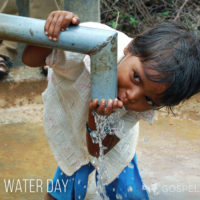The life and work of a missionary are never easy. Whether the missionary is indigenous, laboring among his own people, or from another part of the globe, his mission should always be the same – sharing the Gospel with those who have not heard it.  The Good News, as the Gospel is often called, is “news” because it was previously unknown to the recipients. It is “good” news because it informs its hearers that they can be free from a curse upon their life.
The Good News, as the Gospel is often called, is “news” because it was previously unknown to the recipients. It is “good” news because it informs its hearers that they can be free from a curse upon their life.
They may or may not already feel that their life is cursed. Depending on their particular circumstances, they may feel cursed by poverty, hunger, illiteracy, disease, natural disasters, abuse, or oppression. Millions of people around the world are held captive by each. Poverty is a gated community of despair in which these curses reside and are ready to welcome anyone in.
What is the Good News these people need to hear?
Is it, “I have food and clean water?”
Is it, “We can cure your illness?”
Is it, “We can move you to a safe place?”
Is it, “We can teach you to read?”
Is it, “We can show you how to generate an income?”
Each of these would sound wonderful in the ears of the millions of underserved people in the world. Any one of those offers would raise the spirits and calm the hearts of people caught in whichever existential tyranny holds them in its grip.
The ability of people and organizations from modernized countries to help to ease the burden and pain of these common loads is, indeed, good news. But it is not THE Good News.
What is the Good News Christian missionaries have to offer?
The aforementioned trials and tribulations are common to humanity. The problems are much worse in some venues than in others. Whether by themselves or collectively, they represent a humanitarian crisis wherever they occur. Some crises may last a generation or longer if someone capable does not insert themselves into the situation to provide a remedy.
That is what humanitarian agencies do. They reach out to help others.
Much has been said about the sustainability of humanitarian aid projects over the past 30 years or so. That is due, at least in part, to a consistent pattern of aid organizations addressing the same concerns over and over again. The assistance, in far too many cases, has been akin to repairing an infected appendix with a Band-Aid.
The real problem with humanitarian aid is that it is always inadequate and temporary. Even when the supply of evident resources seems to be “enough to last a lifetime,” the future of both the supply and those in need of it can never be entirely assured.
The crux of the matter for every man, woman, and child is that they must be able to cling to a steadfast hope concerning what happens to them when they die.
Everyone seems to know they are eventually going to die. Most don’t know that after their appointed time, they will stand in judgment before the Creator of the Universe. There are no do-overs. Once this life is ended, we will stand before Him to see if we have been perfect enough to live with Him forever. They need to know this.
There is something deep in the soul of every person that validates our concern that we are not perfect and we can never achieve perfection.
The Good News they need to know is that our Creator loves us and that He wants us to live with Him in Paradise forever. He loves us so much that He sent His Son to earth to bear our guilt and take our punishment so that we can access God the Father through Him. His name is Jesus, and He alone is “the Way, the Truth, and the Life.” Trusting Jesus Christ is the only surety that anyone has that we will stand before our Creator without condemnation.
This space is insufficient to generate an entire systematic theology. Nor do we need to understand all of the nuances of the sure and steadfast hope available only in Jesus.
But millions – many of whom suffer from poverty, hunger, illiteracy, disease, natural disasters, abuse, and oppression – have never heard of Jesus or the joy His name brings to those who have come to love and trust Him.
Why is it so important for missionaries to focus on sharing the Good News?
Should missionaries provide humanitarian aid? Of course. But doing so should never overshadow the urgent and desperate need to share the Good News of the Gospel of Jesus Christ.
Humanitarian aid agencies can provide food, water, education, healthcare, safe living places, and protection from abuse and oppression. But they cannot share the Good News of the Gospel of Jesus Christ. They cannot ensure that any of the recipients of their aid will spend eternity sharing in the glory of God.
Born-again believers have a responsibility to do good and to help others in need. It demonstrates the kindness and grace of our Lord, Jesus Christ. Our greater responsibility is to share the Good News because humanitarian aid agencies don’t.
There is no Good News aside from knowing Jesus Christ. If our mission is anything else, we are on the wrong mission.
Read more news on Evangelism, Humanitarian Services, and World Missions on Missions Box.




